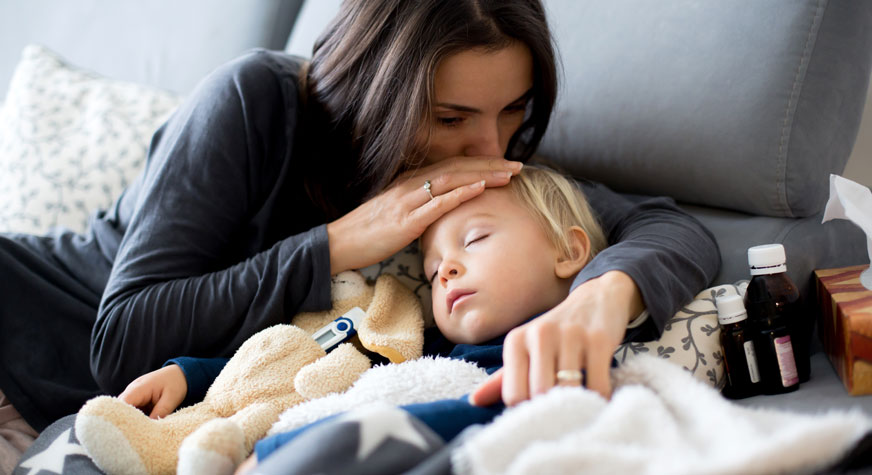The situation of the sick child gives you a wholly new feeling when you are tired of the whole process. It doesn’t matter whether yours is a difficult flu or just a common cold; their discomfort tends to impact both of you at the same time. You can’t always ward off an illness but by gaining some simple tips, you can show your children how to weather a downtime with a little less discomfort and feel better.
Prioritizing Physical Comfort
The promotion of a child’s well-being during an illness starts with meeting its physical requirements. Here are some key strategies to consider: Here are some key strategies to consider:
Relaxation
Urge for a lot of rest. The room should be just as you would like it to be so that it will create a tranquil and cozy space where your child can sleep or just relax. Let certain areas be a little darker, and there should be low noise intensity. Also, provide blankets and pillows with soft fabrics.
Soothing Hydration
Fever and sickness, as consequences incur, result in dehydration. Frequent fluid intake such as only small sips of fluids at once can be of great help. Try Baby Popsicles, transparent soups, or weakened fruit juices. Let water be your baby’s first drink.
Temperature Management
A fever can be as “uncomfortable” as a stitch in a bicycle chain. Adorn your child by layering clothes and keeping the room slightly cool for the baby. It may also be helpful to take a bath that is slightly less hot than usual or place cold compresses on the forehead as it may assist in body temperature regulation through sweating. Still, you must not apply the same now and then otherwise it may be too risky for children.
Pain Relief
For aches and pains, talk with your pediatrician to understand how to safely and correctly administer OTC medications like acetaminophen or ibuprofen. Be sure to have your doctor’s advice in terms of the appropriate dosage so that it is appropriate for your child’s weight and age.
Offering Emotional Support
Aside from the basic needs of physiological needs, paying attention to your child’s emotional well-being is also important. Here are some tips to comfort sick children emotionally:
Extra Cuddles and Attention
Make your child feel special by giving him more cuddles that he loves, gentle rubbing on the back, and whispering sweet nothings in his lecture. Have them understand that you’re their medical supporter and assistance in the recovery process even though they are unwell.
Distraction and Entertainment
The waking time is the time of offering age-fit distractions for the people around him/her to lift their spirits. Tell them stories, sing songs, play quiet games, or show their favorite cartoons. Submit Your Request
Open Communication
Request your kid to share their feelings with you. It helps them to cope better with the situation. Listening slowly and carefully while answering any individual needs or curiosity of their illness that could be comprehended.
Maintaining Routine (when possible)
Maintain the same old routines accessible along with colon restrictions at bedtime so that you can give some greater scale of comfort and safety in a stressful period.
And addressing each age group following its approach
Your stage of comforting your sick child will also vary depending on whether he or she is an infant, toddler, school-going child, or a young adult. Here’s a brief breakdown:
Newborns and Infants
Attention is paid especially to fidgety babies both in the form of soft rocking, singing soothing lullabies, and many instances of skin-to-skin contact.
Toddlers and Preschoolers
Give them the information about their illness in low or medium tones and read the picture books or let them play quiet games.
School-Aged Children
Reinforce the open communication system and address their questions clearly and truthfully. In your care, they can also make choices; they can choose their favorite blanket, or pain medication if it is safe.
Teenagers
Take into account their desire to be independent but also provide the necessary help and care. Furthermore, we need to know other people’s stories to gain a better understanding of various cultures. Invest your time to pay them attention and be ready to offer helpful words of wisdom when requested.
When to Seek Medical Attention
Note that the majority of childhood ailments can be managed comfortably at home without any discomfort by applying these tips to care for sick children, but there are cases where it is better to seek medical attention.
High fever
See your child’s pediatrician in case your baby gets a fever that reaches 104°F (40°C) or more. If your child is over 3 months old, the doctor must be informed if the temperature is over 102°F (38.9°C).
Persistent vomiting or diarrhea
An imbalance between the amount of fluid gained and lost may result in dehydration. Getting medical help is crucial if your child shows persistent vomiting or diarrhea, particularly if they are unable to drink or retain any fluids due to frequent vomiting or intestinal symptoms.
Trouble breathing
Sudden and fast or short breaths, whistles, or breathing stops without taking in more air is a red flag of a serious respiratory infection.
Severe pain or discomfort
If your child suffers from severe pain that they are unable to address with medication or home remedies, then bring this issue to the attention of your pediatrician.
Changes in behavior or alertness
Your child should see a doctor in the event s/he becomes unusually weak, confused, or exhibits a clear change in behavior.
Take note that, you should know that you are not the only one! By meeting their bodily needs of warmth and comfort, demonstrating empathy, and recognizing when it’s time to call for medical help, you can honestly care for your sick child and help them make it through troublesome times.

